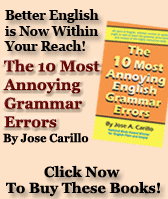- HOME
- ENGLISH FORUM
- BADLY WRITTEN, BADLY SPOKEN
- GETTING
TO KNOW ENGLISH - POUR OUT YOUR MIND IN ENGLISH
- GOING DEEPER INTO ENGLISH
- YOU ASKED ME THIS QUESTION
- EDUCATION AND TEACHING FORUM
- ADVICE AND DISSENT
- MY MEDIA ENGLISH WATCH
- NOTABLE WORKS BY OUR VERY OWN
- ESSAYS BY JOSE CARILLO
- ABOUT JOSE CARILLO
- READINGS ABOUT LANGUAGE
- TIME OUT FROM ENGLISH GRAMMAR
- NEWS AND COMMENTARY
- BOOKSHOP
- ARCHIVES
ESSAYS BY JOSE CARILLO
On this webpage, Jose A. Carillo shares with English users, learners, and teachers a representative selection of his essays on the English language, particularly on its uses and misuses. One essay will be featured every week, and previously featured essays will be archived in the forum.
Giving yourself the confidence to use “like” and “such as”
When writing a formal letter or report that requires a comparative statement or examples, you probably often agonize whether to use “like” and “such as” in your sentences. And I’m sure the following questions invariably pop up in your mind: Precisely when is it correct to use “like” and when to use “such as”? Are there specific and firm rules for the usage of each, or are they freely interchangeable?
These are the questions that I sought to answer in the essay below that I wrote for my English-usage column in The Manila Times in 2005. I suggest you read it and carefully study its prescriptions for the usage of “like” and “such as.” Once you have internalized those prescriptions, you can be confident of not taking a tumble ever again in your usage of these two slippery grammar trippers.Click on the title below to read the essay.
Surely one of the most slippery grammar trippers we will encounter in English is choosing between “like” and “such as” in forming comparative statements or giving examples. Which of them, for instance, is correctly used in the following two sentences? “Exemption from flight pre-boarding procedures like a thorough body search is usually granted to diplomats.” “Exemption from flight pre-boarding procedures such as a thorough body search is usually granted to diplomats.”
If you still haven’t figured out the correct usage, you may take comfort in the fact that you’re not alone in the predicament. The use of “like” and “such as” is actually considered correct in both sentences, but the choice between them has remained debatable all these years. We therefore need to carefully study both sides of the debate so we can put ourselves on more solid semantic footing regarding the usage.
Some grammarians insist that “such as,” which means “for example,” is the only correct usage in such constructions: “Exemption from flight pre-boarding procedures such as a thorough body search is usually granted to diplomats.” They maintain that “like” should never be used as a substitute for “such as,” arguing that “like” doesn’t convey the idea of giving an example at all. Instead, they say, “like” in this usage can only imply similarity, resemblance, or comparison, as in “Her pillow lips look like Angelina Jolie’s.”
Other grammarians are not as restrictive in their prescription for using “like” and “such as,” but they do recommend the following more precise usage for them: (1) Use “such as” to introduce one or more examples that represent a larger subject, as in “Eduardo has a collection of vintage cars such as the 1955 BMW 507 and the 1915 Vauxhall”; and (2) Use “like” to convey the idea that two subjects are comparable, as in “Alberto wants to be a vintage car collector like Ramon.”
Take note, though, that these same grammarians consider “like” to be a close semantic equivalent of “such as.” They are therefore not averse to substituting “like” for “such as” in the sentence given in Item 1: “Eduardo has a collection of vintage cars like the 1955 BMW 507 and the 1915 Vauxhall.” On the other hand, they would find it unthinkable for anyone to substitute “such as” for “like” in the sentence given in Item 2 above. To them, the resulting sentence is unacceptable because it isn’t natural-sounding or idiomatic: “Eduardo wants to be a vintage car collector such as Ramon.”
At any rate, “like” in modern spoken English has practically taken over the role of
“such as” in comparative statements. The forms “such as” and “such...as” are now largely confined to formal writing. “Like,” in contrast, is now the preferred form for informal usage in which the example being given is offered not simply as an example but as the topic of the sentence itself, as in this case: "We are delighted to have a generous benefactor like Bill Gates." Using “such as” instead of “like” in such sentences must be firmly avoided, for it gives the sentence a false ring: “We are delighted to have a generous benefactor such as Bill Gates.”
In formal writing, of course, we are well advised to distinguish carefully between “like” comparisons and “such as” comparisons. In a “like” comparison, only one person or object from the class is usually named, and that person or object is understood to be excluded from the group being discussed. Take this example: “If you are a student taught by a brilliant mathematics teacher like Prof. Alberto Reyes, you would learn differential calculus in no time at all.” This comparison is about the possibility of students being taught by mathematics teachers whose brilliance is comparable to Prof. Alberto Reyes’s, with Prof. Reyes himself specifically excluded from the comparison.
On the other hand, in a “such as” or “such...as” comparison, one or several persons or objects can be named in the comparison, and all of those persons or objects are understood to be included in the group being discussed. Take these two sentences:
“With highly capable mathematics professors such as Prof. Alberto Reyes and Prof. Eduardo Cariño handling the differential calculus classes, we can expect a much higher percentage of passing among the students.”
“With such highly capable mathematics professors as Prof. Alberto Reyes and Prof. Eduardo Cariño handling the differential calculus classes, we can expect a much high percentage of passing among the students.”
In both sentences, the comparison this time is about brilliant mathematics teachers as a class whose members include both Prof. Reyes and Prof. Cariño.
Now that we can clearly distinguish the semantic difference between “like” and “such as,” we should now be able to use them without fear of tripping in our grammar.
From the weekly column “English Plain and Simple” by Jose A. Carillo in The Manila Times, September 26, 2005 issue © 2005 by the Manila Times Publishing Corp. All rights reserved.
----
Previously Featured Essay:
Let’s settle this vexing word-choice problem once and for all: Do we use the adverb “presently” to mean “at present” or “very soon”? I realize that I had already taken a position on this matter years before in this column—that the word should mean “very soon” and not “at present”—and I must admit that when I’m copyediting manuscripts, I always itch to change “presently” to “now” when the author had obviously used the word in that sense, as in “The couple presently lives in a charming little apartment.” But then, when I watch a British movie with snotty butler telling snotty master “I’ll be with you presently, sir,” I’m absolutely sure that the word means “very soon” instead.
The truth of the matter is that “presently” has two acceptable senses in current usage: “currently” or “at the present time,” and “very soon” or “in a short time.” The neologisms “antagonym” and “contranym” have been coined for words like this, which could sometimes mean the opposite of itself. At any rate, The American Heritage Book of English Usage says that “at the present time” or “currently” was actually the original sense of “presently,” one that dates back to the late 14th century. For some reason, though, the usage seems to have disappeared from the written record in the 17th century. This disappearance, my digital Merriam-Webster’s 11th Collegiate Dictionary implies, was probably what prompted the authoritative Oxford English Dictionary to declare in 1909 that that sense of the word had become obsolete—even as the OED observed that the sense remained in regular use in most English dialects.
Since then, some language critics have became biased against the “now” sense of “presently,” declaring it erroneous usage. They insist that “presently” should be used only in its primary sense of “soon” or “in a short time.” In fact, according to The American Heritage Book of English Usage, only 50 percent of its Usage Panel found the “now” sense of “presently” acceptable. (In one recent official count, the Usage Panel had 180 members, including such notables as Jacques Barzun, educator; Alfred Kazin, English professor; Henry Louis Gates Jr., humanities professor; Anne Tyler, Margaret Atwood, and Pat Conroy, novelists; Paul Theroux, travel writer; and William Zinsser, writer-editor.) This, of course, puts sentences like “The 29th Olympics is presently being held in Beijing” in serious jeopardy. Indeed, it’s obvious that if the Usage Panel had their way, they’d rather restate that sentence as “The 29th Olympics is [now, at present, currently] being held in Beijing.”
I must admit that it was the collective judgment of all these English-language notables that had persuaded me to take a firm position in this impasse. I’m not saying that the “now” sense of that word is incorrect, but being not a native English speaker and not bound by a particular English dialect, I’d rather rely on how professional users of American English perceive the meaning of a word than on simple dictionary meaning or anecdotal evidence.
Thus, to avoid confusing myself and my readers, I would never use “presently” in this sense: “They are presently in Boracay Beach on their honeymoon.” Hands down, I would use “now” as first option, and perhaps use “at present” only if I have already used a lot of “nows” in preceding sentences. As to “currently,” I’d shy away from it because the word sounds to me too officious for comfort. These, too, would be my advice to writers who until now are unsure of how to deal with “presently.”
One more question needs to be answered, of course: When do we use “presently” to mean “very soon,” if at all? Well, perhaps when we’re in London to visit the Queen, and the cab driver is badgering us to hurry up while we’re buying some souvenirs, we can tell him with absolute nonchalance: “Just you wait. I’ll be with you presently.”
From the weekly column “English Plain and Simple” by Jose A. Carillo in The Manila Times, Saturday, August 16, 2008 issue © 2008 by the Manila Times Publishing Corp. All rights reserved.
----
Click to read more essays (requires registration to post)







